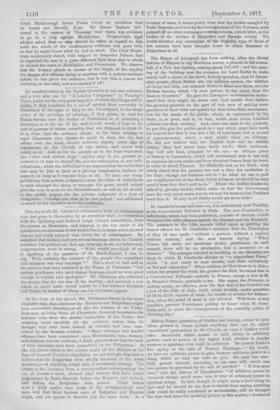M. Gambetta's case will come on, it is understood, next
Tuesday, at the Correctional Tribunal in Paris. The acte d'accosation, or indictment, which has been published, consists of various counts charging him with offences against the Marshal and his Ministers. The passages in the Lille speech relied upon as proving the former offence are M. Gambetta's assertion that the Dissolution of May 18 was made "without a pretext, without a motive, without reasons," and the now famous saying, "When France has made her sovereign choice, gentlemen, be well assured, there will be no alternative, but se sonmettre on se demettre." The passages selected as insulting to the Ministry are those in which M. Gambetta alludes to "a stipendiary Press," which "is ever ready to vent insults, and lives exclusively on lies and calumnies." What sedition or libel there is in this-a. unless the greater the truth the greater the libel, be sound law in a Correctional Tribunal—nobody in France, except a few of M. de Broglie's friends, pretends to see. His organ, the Francais, is making merry, we observe, over the fact that it has ferreted out a law of the 27th of July, 1849, which forbids, under penalties of 28 to 2120, reports of trials for insults or actions for defama- tion, when the proof of facts is not allowed. Will these or any penalties prevent Frenchmen getting to know what M. Gam- betta said, or avert the consequences of the cowardly policy of silencing him ?






























 Previous page
Previous page